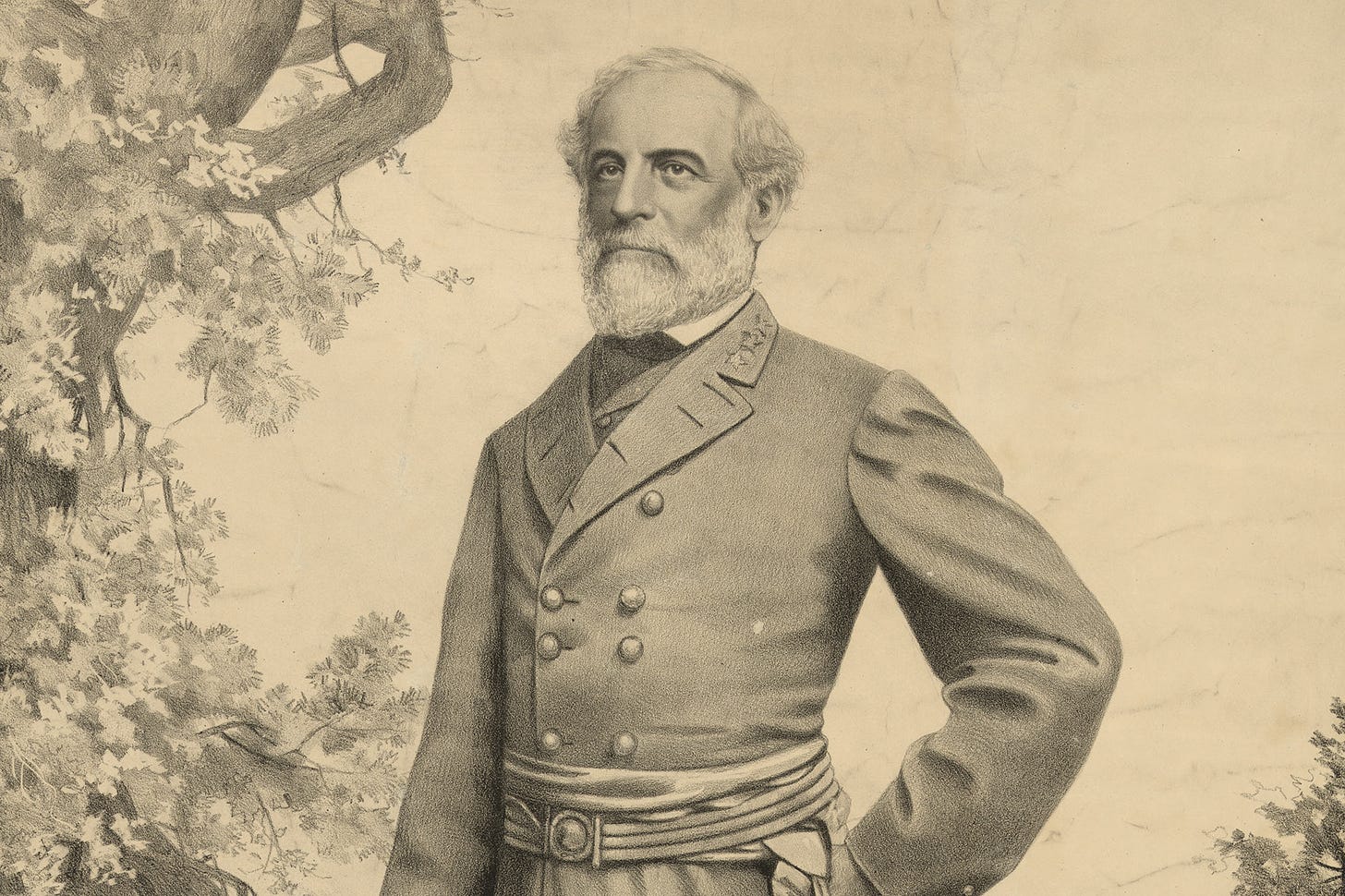Happy Robert E. Lee Day!
Today is the twenty-ninth and final day of my month long heritage history posts in which I offer a few somewhat arbitrary reflections on important figures from our past. The entire point of this series was to counter-signal the ethos and spirit of the Regime’s mobilization of history to serve as a humiliation of our traditions and undermine our cultural inheritance.
I can think of no greater symbol of defiance against this spirit than concluding in celebration of Robert E Lee. A descendent of George Washington and heir of the American experience of Virginia, Lee embodies so many of the ideals necessary in our age of dissolution.
There are many things to say about Lee: he was a gentleman who had a keen sense of his own noblesse oblige; he was a Christian man who made constant reference to his role in a Christian society; he was a man who exemplified the classical ethics of ordered loves, always prioritizing the interests of his family and his people over any other more general obligations. He represents the now-dissipated obligations of Southern Honor codes, the dual duty of both forgiveness and resolve, and the ancient paradox of giving of oneself to find true happiness.
Robert E. Lee of course was a man not of unrestrained passion, but of Aristotelian moderation; his decision to arise and defend the well-being and integrity of his Southern people came not out of ideological disposition, but duty to hearth and home in a moment of crisis between two loves. He loved the United States in the sense that there was a common experience between two factions that had long been held in a complex of uneasy tension. He had given of himself for the stability of the United States during the Mexican-American war, and continued in service to his country throughout the 1850s.
The news of a civil war was painful to Lee. Having long sought a commanding position in the United States Army, it came to pass that his first opportunity would be in the context of a crisis between this army and the people of Virginia (among other Souther states, of course). He was not after secession, preferring instead to defend the Old Republic as it was constituted in the first decades of its life. When asked by Lincoln to be the Union Army’s commander-in chief though, he could not bring himself to accept.
He stated in his rejection:
“If the Union is dissolved and the government disrupted, I shall return to my native state and share the miseries of my people and save in defense will draw my sword on none.”
His wife later wrote:
“My husband has wept tears of blood over this terrible war, but as a man of honour, and a Virginian, he must follow the destiny of his state.”
This to me is the thing that strikes me most about Robert E Lee: his people and their well-being always meant more to him than any ideological crusade, any grand experiment, and certainly anything that could be conceived as a propositional nationhood. People—real people, in the social-corporate sense—have a more fundamental claim on his duties than all other endeavors. He could not be paid to betray his heritage.
At the moment when both North and South needed him—when he by nature and experience would have preferred to serve both—his sense of duty fell toward the ageless guidance on Ordered Loves: those closest to you are owed your most fundamental affections. And in retrospect, though having experienced a painful defeat, Lee never regretted his decision: to lose for one’s people is more preferable than to win in opposition to those people.
Over the course of the next century, Lee would become a symbol of unity. There were still—understandably—Lost Causers who remained bitter; but Lee taught us that we as humans must accept the experiences of History and make the best of it. More venomous enemies would eventually come to America and this would require recalculation as to the Friend-Enemy distinction. In a world where the despisers of American and Western civilization seek to tear down the very memory of Robert E Lee, we whose roots are in both North and South and West must raise it back up. He must be the symbol of our unity against the occupied Regime.
Few things symbolize our present moment more forcefully than the act of tearing down Robert E Lee’s statues. This act is an outflow of a deeply spiritual problem that has permeated its way into every aspect of our social context. We are at war with those who would seek to sever us from our very historical being. There’s an element of the medieval doctrine of “Participation” in our connection to our heritage, and the Regime that seeks to sever us from our past is actually seeking our spiritual death; for we are connected to our heritage in our very souls.
I think Dwight Eisenhower summarized his legacy so wonderfully when he noted:
“Through all his many trials, he remained selfless almost to a fault and unfailing in his faith in God. Taken altogether, he was noble as a leader and as a man, and unsullied as I read the pages of our history. From deep conviction I simply say this: a nation of men of Lee’s caliber would be unconquerable in spirit and soul.”
We are all Robert E Lee. And the tearing down of his memory is an act of socio-cultural homicide. We must defend him, for in defending him we are defending ourselves, and those who are yet to be born.
It’s been an honor fighting for our identity together with you all.
Happy Heritage History Month.





General Lee may well be the greatest American ever to live. A fantastic choice, C.Jay and a supremely satisfying capstone to your month-long work. Thank you for all you do.
What is a good book about Robert E Lee? Hopefully easily obtainable.